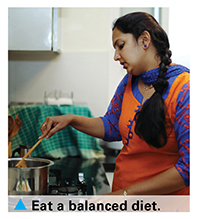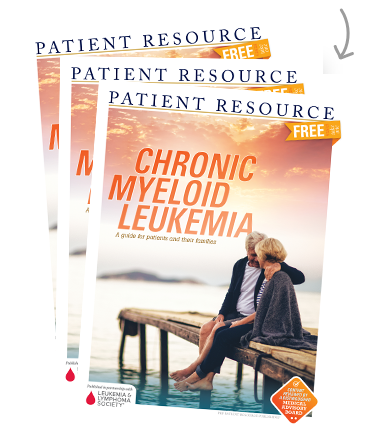Chronic Myeloid Leukemia
Healthy Lifestyle
How you manage your CML will depend on your unique diagnosis, your overall health and other factors. Focus on making positive choices in many areas of your life. Read on for suggestions, and ask your health care team about other ways to manage your condition.



Start by taking charge. Having a long-term illness can make you feel out of control, so it may help to find things you can control. Commit to being an active partner with your health care team. Learn how to manage your medication. Choose to have a positive attitude. Get organized.
Follow a healthy diet. Make smart nutrition choices, such as eating fresh fruits and vegetables, lean protein and low-fat dairy products, and drinking water.
Maintaining a healthy body weight is important. That may be challenging if side effects of treatment make it difficult to eat. An oncology dietitian or a registered dietitian can help you develop a nutrition plan that meets your specific nutritional needs. If you do not have that resource on your health care team, ask your doctor for a referral.
Stay active. Studies show that being physically active is beneficial for people who are recently diagnosed with cancer or who are in treatment.
Ask your doctor about taking part in physical activities, such as walking or bike riding. Moderate exercise even for a short time can enhance physical well-being and spur recovery as well as increase muscle strength, joint flexibility and general conditioning, improve cardiovascular function and protect bone health. It can also help reduce fatigue, a common treatment-related side effect.
Lower your risk of infection. Having CML may make you neutropenic at times. Neutropenia is a condition caused by a decreased number of white blood cells that fight off infection. If you are neutropenic, your immune system is weak and you are at an increased risk of infection.
Ask your doctor about the infections that may arise from CML and its treatments and side effects to ensure you know how you can help prevent them, what symptoms to watch for and what to do if they occur. This may include how to avoid developing infections from pets, while gardening or during travel. Also ask which vaccinations are safe for you.
Practicing food safety can reduce your risk of food poisoning caused by eating food contaminated with harmful bacteria, viruses or parasites. Ask your health care team for ways you can help protect yourself against foodborne illnesses.
Care for your emotional well-being. Living with CML may bring up a range of emotions, and addressing them is important for your mental health. Recognize that it is OK to be angry, anxious or depressed. Talk with a counselor or practice stress management and relaxation techniques. Exercise is also a natural mood lifter. If you become depressed, talk with your doctor. Counseling or medication may help. If you have suicidal thoughts, seek medical attention immediately.
Surround yourself with support. Support comes in many forms. Along with drawing on relationships with family members, friends and coworkers, you may also choose to explore support groups. They are available in many formats, from in-person groups and online forums to one-on-one telephone calls. Talking with others who are in or who have been through a situation similar to yours may be extremely helpful.
Many types of support groups exist. Some focus on learning about cancer or working through feelings. Others are informal and social. Look online to find a group or ask your health care team for a referral. You may try a few before you find one that is a fit for you.
Religion may be a source of strength. Some members of the clergy are specially trained to help people with cancer and their families. Spirituality may be important to you. Performing small acts of kindness helps some people. Others meditate or spend time in nature. Find whatever helps you heal.



